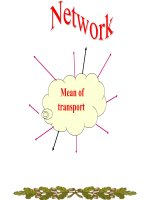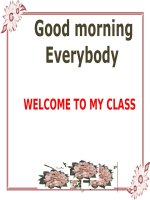- Trang chủ >>
- Luật >>
- Luật dân sự
Unit 07 Pollution Lesson 6 Skills 2
Bạn đang xem bản rút gọn của tài liệu. Xem và tải ngay bản đầy đủ của tài liệu tại đây (102.7 KB, 4 trang )
<span class='text_page_counter'>(1)</span>UNIT 7 : POLLUTION. PERIOD 63: lesson 5: SKILL 2 I/ Objectives: 1. Educational aim: -By the end of the lesson, sts will be able to: - Listen to get specific information about the topic: Thermal pollution. - Write a paragraph about the causes and effects of one type of pollution in your area. 2. Knowledge - Vocabulary: extra words related to the topic: pollution. - Grammatical structures: 3. Skills: Listening and writing. II/ Teaching aids: - T: lesson plan, visual pictures, aids Steps and time A.Warm up(3’) B.Listening(15’ ) * Pre task. * Task cycle. Learning activities. Language focus T asks: What do you know about the Works related thermal pollution? to thermal 1. Describe what you see in the pollution. picture and talk about the relationship between them. + algal bloom Ss work in pairs describing the + cooling pictures and the relationship tower between them. Call on one or two Ss + power to give their answers. Play the station recording for Ss to check their answers. Ask Ss what they know about thermal pollution. Key: The first picture shows an algal bloom in coastal seawater. The second picture shows the cooling towers from a power station. They are both related to 1. hotter thermal pollution. 2. cooler 2. Have Ss quickly read the diagram 3. cool and identify the from of the word/ 4.warm rivers phrase to befilled in each blank. For 5. warmer example, the words for blanks 1 and water 2 are adjectives. Play the recording 6. fish once. Ask for Ss’ answers and write population them on the board. If all the answers 7. Harmful are correct, more to the next activity. 8. colour If Ss are not sure about their 9. Poison answers, play the recording again 10. Cool down for Ss to check. Make changes to the answers on the board.. Models - Whole class.. - Individual. - Individual. Pair work Individual..
<span class='text_page_counter'>(2)</span> * Language analysis. Key: 1. hotter 2. cooler 3. cool 4.warm rivers 5. warmer water 6. fish population 7. Harmful 8. colour 9. Poison 10. Cool down Audio script: Reporter: Does thermal pollution mean that bodies of water get hotter, Mr Nam? Mr Nam: Not always. Sometimes + discharge the water becomes colder, and that’s + reservoir thermal pollution. In general, thermal pollution means a change in the water temperature. Reporter: That’s interesting! What causes it? Mr Nam: Power stations are factor. They use water in the nearby lakes or rivers to cool their equipment, which heats up the water. Then they dump the hot water back into its source. Reporter: Are there any other causes? Mr Nam: Yes. Thermal pollution may also happen due to the discharge of cold water from reservoirs into warm rivers. Reporter: Thermal pollution can have dramatic effects. Right? Mr Nam: Certainly. Most aquatic creatures need a certain temperature to survive. Warmer water has less oxygen in it, and this can harm fish populations. Beside, warmer water can cause harmful algal blooms. This can change the. - Whole class.
<span class='text_page_counter'>(3)</span> C.Writing(15’). Reporter:. * Pre stage. Mr Nam:. * Through stage. Reporter:. * Post stage. D. Performing(10’ ). colour of the water like in the first picture and more seriously, the algae poisons the fish. What can we do, Mr Nam? In many places, they build cooling towers like in the second picture to cool down the water from power stations. Anything else we can do? …. Writing In this writing part, Ss are asked to write about the causes and effects of one pollution type in their area. Recap on the types of pollution by turning quickly back to the beginning of the unit in the GETTING STARTED section. 3. Ss work in pairs and decide which pollution type their area they are going to discuss. Have Ss take notes of the causes and effects. Move around to offer help as pairs discuss their ideas. 4. Ss stay with their partner. One writes about the causes and the other writes about the effects based on their notes from 3. Remind Ss to use markets like firstly, secondly finally to navigate through their points. Move around to offer help and take notes of any structures or language that Ss are struggling with. Bring the whole group together if there is a point T wants to clarify, then they can continue with the writing. 5. Now have Ss share their work with each other and combine it to make a complete article. Tell them that they should add one or two sentences at the beginning to introduce the topic and other ones at the end to conclude their article.. Pair work. Pair work. Individual.
<span class='text_page_counter'>(4)</span> Note, if Ss need more support, post the sample article (see next page) on the board as a reference when Ss get to this stage of the lesson. This will help them structure their work. Next, have pairs swap and read each other’s articles. Finally, ask for volunteer pairs to read their articles out to the class and have Ss comment on them. Then collect all the articles for marking. Sample article: Water pollution There are several types of pollution. However, water pollution is the most serious in our area. It is caused by several factors. Firstly, families dump sewage into the river. In the past it was a very beautiful river, but now the water is almost black. Secondly, there are two new factories in our area, and they are dumping chemical waste into the lake and river. Thirdly, pesticides are another source of Whole pollution. Farmers in our area class E. Homework. usually use these to kill insects. (2’) Water pollution badly affects our area. We do not have enough fresh waster to water the plants and crops. People cannot raise fish in the river and the lake because the water there is so polluted. In addition, there are no more wild ducks near the river today since they cannot find fish for food. Another negative effect is that sometimes in the afternoon there is a bad smell from the polluted river, so people do not like walking along it anymore. People in our area al aware of this problem, and we are thinking of ways to solve it. - Ss do exercises in workbook *Feedback:…...………………………………………………………………………….
<span class='text_page_counter'>(5)</span>









